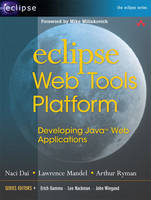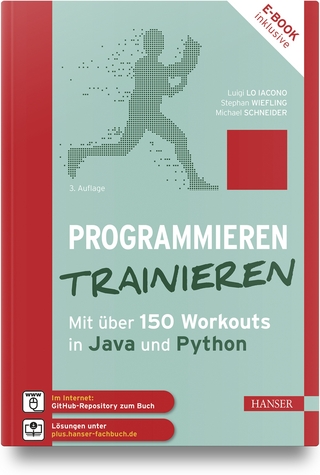
Eclipse Web Tools Platform
Addison-Wesley Educational Publishers Inc (Verlag)
978-0-321-39685-3 (ISBN)
- Titel ist leider vergriffen;
keine Neuauflage - Artikel merken
Discover WTP, the New End-to-End Toolset for Java-Based Web Development The Eclipse Web Tools Platform (WTP) seamlessly integrates all the tools today’s Java Web developer needs. WTP is both an unprecedented Open Source resource for working developers and a powerful foundation for state-of-the-art commercial products.
Eclipse Web Tools Platform offers in-depth descriptions of every tool included in WTP, introducing powerful capabilities never before available in Eclipse. The authors cover the entire Web development process–from defining Web application architectures and development processes through testing and beyond. And if you’re seeking to extend WTP, this book provides an introduction to the platform’s rich APIs. The book also
Presents step-by-step coverage of developing persistence, business logic, and presentation tiers with WTP and Java
Introduces best practices for multiple styles of Web and Java EE development
Demonstrates JDBC database access and configuration
Shows how to configure application servers for use with WTP
Walks through creating Web service application interfaces
Covers automated testing with JUnit and Cactus, and automated builds utilizing Ant, Maven, and CruiseControl
Introduces testing and profiling Web applications with the Eclipse Test and Performance Tools Platform (TPTP) project
Describes how to extend WTP with new servers, file types, and WSDL extensions
Foreword
Preface
Acknowledgments
About the Authors
Part I: Getting Started
Chapter 1: Introduction
Chapter 2: About the Eclipse Web Tools Platform Project
Chapter 3: Quick Tour
Chapter 4: Setting Up Your Workspace
Part II: Java Web Application Development
Chapter 5: Web Application Architecture and Design
Chapter 6: Organizing Your Development Project
Chapter 7: The Presentation Tier
Chapter 8: The Business Logic Tier
Chapter 9: The Persistence Tier
Chapter 10: Web Services
Chapter 11: Testing
Part III: Extending WTP
Chapter 12: Adding New Servers
Chapter 13: Supporting New File Types
Chapter 14: Creating WSDL Extensions
Chapter 15: Customizing Resource Resolution
Part IV: Products and Plans
Chapter 16: Other Web Tools Based on Eclipse
Chapter 17: The Road Ahead
Glossary
References
Index
This book is an invaluable resource for every Eclipse and enterprise Java Web developer: both those who use Eclipse to build other Web applications, and those who build Eclipse technologies into their own products.
Complete source code examples are available at www.eclipsewtp.org.
Naci Dai, chief scientist and founder of eteration, a.s., is a member of the WTP project management committee, leads its JST subproject, and leads the Open Source Lomboz project, which was a part of the initial code contributed to WTP to seed the project. Lawrence Mandel, a software architect and developer at at the IBM Toronto Laboratory, is a WTP committer and served as the project’s ecosystem and documentation lead up until the 1.5.2 release. Arthur Ryman, software architect and development manager at the IBM Toronto Laboratory, has a decade’s experience building Java Web development tools. He led the creation of the WTP project, and led the WST subproject up until the release of WTP 1.5.
Foreword xviiPreface xixAcknowledgments xxiiiAbout the Authors xxvPart I: Getting Started 1Chapter 1: Introduction 3Java Web Application Development and Eclipse 3
What This Book Contains 4
How This Book Is Organized 5
Source Code Examples 8
Introducing League Planet 9
Summary 10
Chapter 2: About the Eclipse Web Tools Platform Project 13WTP Is Born 13
WTP Economics 15
The Structure of WTP 22
Contributing to WTP 37
Summary 40
Chapter 3: Quick Tour 41Overview 41
Iteration 1: J2EE Web Applications 44
Iteration 2: Servlets and Scriptlets 60
Iteration 3: Database Access 71
Iteration 4: Web Services 82
Summary 88
Chapter 4: Setting Up Your Workspace 91Installing and Updating WTP 91
Configuring WTP 105
Summary 110
Part II: Java Web Application Development 111Chapter 5: Web Application Architecture and Design 113The Web Landscape 113
Web Applications 115
Service-Oriented Architecture (SOA) 130
Case Study: League Planet 133
Summary 135
Chapter 6: Organizing Your Development Project 137Web Project Types and J2EE Applications 138
Advanced Web Projects 160
Example Projects 165
Summary 196
Chapter 7: The Presentation Tier 199Introduction 199
Interaction Design 200
Graphic Design 203
The Structure of the Presentation Tier 204
Iteration 1: Static Web Projects, HTML, and the
Iteration 2: CSS 230
Iteration 3: JavaScript 234
Iteration 4: XML and XSLT 248
Iteration 5: DTD 257
Iteration 6: Servers, Dynamic Web Projects, and Servlets 261
Iteration 7: JSP 279
Iteration 8: Monitoring HTTP Sessions 289
Summary 295
Chapter 8: The Business Logic Tier 297A Common Business Tier Design 300
Iteration 1: The Domain Model 301
Iteration 2: Developing Session EJBs 325
Iteration 3: Message-Driven Beans 358
Summary 367
Chapter 9: The Persistence Tier 369Designs for the Persistence Layer 370
Overview of Iterations 374
Iteration 1: Creating a Database 375
Iteration 2: Data Layer 386
Iteration 3: Entity Beans 392
Summary 418
Chapter 10: Web Services 421WSDL 422
SOAP 423
REST 424
REST Style Web Services 426
Overview of Iterations 427
Iteration 1: Developing Web Services Top-Down 428
Iteration 2: Developing Web Services Bottom-Up 454
Iteration 3: Generating Web Service Client Proxies 464
Iteration 4: Testing Web Services for Interoperability 470
Iteration 5: Using Web Services in Web Applications 477
Iteration 6: Discovering and Publishing Web Services 494
Summary 508
Chapter 11: Testing 509Automated Testing 511
Overview of Iterations 512
Iteration 1: Unit Testing with JUnit 512
Iteration 2: Integration Testing with Cactus 520
Iteration 3: System Testing with HttpUnit 528
Iteration 4: Performance Testing with TPTP 533
Iteration 5: Profiling with TPTP 540
Summary 546
Part III: Extending WTP 549Chapter 12: Adding New Servers 551Overview of Adding a Generic Server Adapter 554
The GlassFish Server Runtime 554
Server Adapter Plug-Ins 556
Adding Support for a New Server Runtime 558
Adding a New Server Type for a Runtime 561
Adding a New Runtime Target Handler 562
Facets and Runtime Components 563
Extending the Server Tools UI 565
The Generic Server Definition 566
Publishers 570
Testing the Server Adapter 573
Summary 580
Chapter 13: Supporting New File Types 583Creating the DocBook Extension Plug-In 585
The DocBook Validator 585
Creating a Custom Marker Type 598
Declaring the DocBook Content Type 601
Summary 605
Chapter 14: Creating WSDL Extensions 607Creating the WSDL Extension Plug-In 612
Extending the WSDL Editor 612
Extending WSDL Validation 635
Summary 644
Chapter 15: Customizing Resource Resolution 645Creating the Resource Resolution Extension Plug-In 647
Contributing Resources to the XML Catalog 648
Implementing a Custom Resource Resolution Strategy 657
Summary 665
Part IV: Products and Plans 667Chapter 16: Other Web Tools Based on Eclipse 669Java Web Tools 669
Perl Web Tools 674
PHP Web Tools 674
Python Web Tools 675
Ruby Web Tools 675
Summary 675
Chapter 17: The Road Ahead 677Eclipse Data Tools Platform (DTP) Project 678
Eclipse JavaServer Faces (JSF) Tools Project 678
Eclipse Dali Java Persistence Architecture (JPA) Tools Project 679
Eclipse AJAX Tools Framework (ATF) Project 679
Java Enterprise Edition 5 679
Apache Axis2 and W3C WSDL 2.0 680
Eclipse PHP Development Tools Project 680
Eclipse SOA Tools Platform (STP) Project 681
Conclusion 681
Glossary 683References 689Index 697
| Erscheint lt. Verlag | 31.5.2007 |
|---|---|
| Verlagsort | New Jersey |
| Sprache | englisch |
| Maße | 178 x 235 mm |
| Gewicht | 1040 g |
| Themenwelt | Informatik ► Programmiersprachen / -werkzeuge ► Java |
| Mathematik / Informatik ► Informatik ► Web / Internet | |
| ISBN-10 | 0-321-39685-5 / 0321396855 |
| ISBN-13 | 978-0-321-39685-3 / 9780321396853 |
| Zustand | Neuware |
| Haben Sie eine Frage zum Produkt? |
aus dem Bereich


